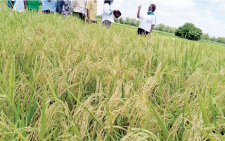State to put in measures to cut post-harvest losses

The government plans to implement a raft of measures targeting to cushion farmers from seasonal post-harvest losses and guarantee improved returns on produce, an official has said.
Evans Kidero, chairman of the Kenya National Trading Corporation (KNTC) highlighted that the post-harvest management strategies will include mopping up cereal from farmers for storage in the National Cereals and Produce boards (NCPBs) warehouses and silos.
Further, Kidero stated, the government will acquire the cereals from the farmers at better prices, with a target to reduce related post-harvest losses.
He revealed that they intend to mop up the produce from farmers and release it back to consumers at standardised prices.
The move, he said, seeks to stabilise the commodities prices.
“The government realised that a lack of storage facilities causes destruction of farm produce in the country. But we now have adequate storage facilities to stop farmers from selling their produce at throw-away prices,” he said during a press briefing in Rangwe constituency, Homa Bay county.
Bumper losses
According to Kidero, post-harvest losses are a major contributor to declining food security in the country.
He assured that his department is working with other government agencies to ensure the modalities against post-harvest losses are implemented to benefit farmers.
“When we mop up maize and other produce, we are going to cushion farmers from losses. On the other hand, we are going to protect consumers by stabilising their prices,” he said, while urging farmers to instead plant crops on a large scale during the ongoing planting season for the country to realise bumper harvests and attain food security.
Post-harvest losses are a serious challenge affecting many farmers. Such losses interfere with the income which the farmers expect from their production.
It is estimated that losses related to post-harvest among Kenyan farmers stand in the range of 30-40 per cent, translating to a loss of Sh72 billion annually across diverse value chains.
Kidero told farmers to take advantage of the subsidised fertilisers to grow cereals on a large scale.
“We’re committed to supporting farmers so that we stabilise prices to ensure Kenya doesn’t go back to where we were in 2022 when a 2-kilogramme packet of maize flour was selling at Sh230,” he stated.














